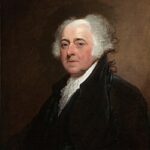John Adams made one of America’s most strategic decisions when he championed the US Navy establishment in 1798. Facing increasing threats from French privateers during the Quasi-War, Adams recognized that America needed its own naval force. The young nation had relied on borrowed ships and makeshift vessels since the Revolutionary War.
Creating the Naval Infrastructure
Adams signed legislation establishing the Department of the Navy on April 30, 1798. Benjamin Stoddert became the first Secretary of the Navy, overseeing America’s maritime transformation. The president authorized construction of six powerful frigates, including the legendary USS Constitution. 📊 Congress allocated $688,888.50 for naval construction, a massive investment for the era.
Strategic US Navy Establishment Goals
The decision addressed multiple national security concerns simultaneously. American merchant ships faced constant harassment from European powers. ⚠️ Without naval protection, American commerce remained vulnerable to foreign interference. Adams understood that true independence required control over American waters and trade routes. 💰 The economic benefits of protected maritime commerce would far exceed construction costs.
Impact:
The US Navy establishment transformed America from a vulnerable coastal nation into a formidable maritime power. Within months, American frigates were patrolling shipping lanes and engaging French vessels. The USS Constitution earned the nickname “Old Ironsides” after defeating HMS Guerriere in 1812.
Long-term Naval Power Projection
Adams’ naval foundation enabled future American expansion and trade protection. The Navy Department grew into one of America’s most important institutions. 🌍 By 1800, the US Navy had captured 85 French vessels and recaptured 70 American ships. This success established America’s credibility as a maritime nation worthy of international respect.
Economic and Strategic Consequences
Protected American shipping lanes boosted international trade significantly. Insurance rates for American vessels dropped as naval protection increased. The shipbuilding industry flourished, creating thousands of jobs in coastal cities. 🔥 Most importantly, the permanent naval force deterred future foreign aggression against American commerce.
Historical Legacy of Naval Independence
Historians consistently praise Adams’ naval vision as transformative for American development. The decision established precedent for federal investment in national defense infrastructure. Modern analysts credit the US Navy establishment as foundational to America’s eventual emergence as a global superpower.
